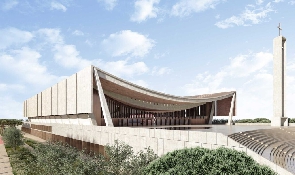Ghana is currently in crisis economically but will soon be in deeper trouble when President Akufo- Addo insists on honoring his private promise to God without a well-informed project management plan.
The President claims he must honor his commitment to building a cathedral for Ghanaians because his God had kept his part of the contract by making him victorious in the Presidential elections. His decision to play a politico-religious game with the nation's resources seems irresponsible and should not be tolerated.
The President is confident he will build the Cathedral before leaving office primarily because he has the full backing of his nephew, the finance minister, and colleagues. The question is, why so little opposition from Ghanaians?
A possible explanation is that most Ghanaians are in a predominantly theological state of mind and may find it difficult to oppose an inappropriate and ill-timed project that may deepen the country's economic woes. One of the foremost social theorists who made his presence felt at the Department of Sociology, Legon, Professor Assimeng, of blessed memory, observed Ghanaians are 'notoriously religious'.
The President understands thoroughly the religious principle that the supreme being sanctions sinners and knows how to use it to his benefit. Therefore, he made religious leaders from various denominations play leading roles as trustees in his cathedral project.
For me, this strategy seems to be a canning way of luring Ghanaians, especially those who wouldn't like to attract the sanctions of God, to accept and contribute to building the Cathedral without questions.
Fortunately, some politicians and the clergy have gathered the courage to raise issues with the Cathedral project of the President. Bold religious leaders, including Rev. Dr. John Ghartey, showed courage when speculations on the building of the Cathedral came to the fore.
For Rev. Ghartey and a few others, it is difficult to understand the President's position as most Christians do not lack a place to worship in Ghana. The various churches have large premises that could serve the purpose, considering the state of the country's economy and priorities.
Dr. Mensa Otabil of the International Central Gospel Church was the first to give up his position as a National Cathedral Board of Trustee member due to illegal happenings. Another religious leader, a former National Cathedral Board of Trustees member, Bishop Dag Heward Mills, has withdrawn his active participation in the project due to a lack of transparency.
Also, some vociferous politicians have called for probity and accountability. Hon. Ablakwa, for example, has started scrutinizing the project's finances, explicitly challenging a man of God, Rev. Kusi-Boateng, who has a significant role in constructing the Cathedral. Archbishop Nicholas Duncan Williams and Rev Eastwood Anaba suggested, for example, that the building project should stop until all homework has been done, including the timing of the project.
Leaders of some religious denominations have been tasked with implementing the project. However, what is unclear to me, is how the Cathedral will be managed when completed, especially when the clergy leading the project at this early stage disagree with each other on emergent issues and the way forward.
While the focus has been on the economic and financial matters connected to the Cathedral project, the critical question is, how can the various denominations manage the Cathedral's doctrinal agenda without clashes? The various religious denominations in the country have many things in common but significantly differ when it comes to practicing their faith.
Therefore, making clergies from different Christian religious denominations play an active part in the project's development and management seems problematic. If the running of this project, which the President insists will be built, is not adequately controlled by the state, we should envisage a significant problem, a looming management conflict.
Even though Côte d'Ivoire also committed a similar miscalculation, we can learn from their example to eliminate future inter-denominational strife in the country. When President Félix Houphouët-Boigny built his Basilica of Our Lady of Peace of Yamoussoukro, he donated it to the Catholic church.
The Catholic church, therefore, assumed the central role of running the Basilica. In a country with many religious denominations, a solution may be to make the Cathedral, if built against all odds, wholly state-owned, financed, and managed, making all Ghanaians automatic owners of the state Cathedral.
Although a well-timed Cathedral may have its charms and benefits, I believe that building a National Science and Mathematics 'Cathedral', instead of a religious edifice, may increase the interest of Ghanaian children in the natural sciences, a necessary step to rebuilding our nation.
Thank you!
Opinions of Saturday, 11 March 2023
Columnist: Kwesi Kassah



















